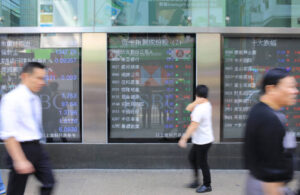# US Consumer Confidence Plummets – What It Means for Investors
The latest data reveals a concerning trend in consumer sentiment that could have significant implications for the financial landscape. In March, the U.S. Consumer Confidence Index sharply declined from 100.1 in February to 92.9. This drop not only reflects increasing apprehensions regarding income and the labor market but also casts a shadow over the broader economic outlook.
As members of the Extreme Investor Network, we believe that understanding these dynamics is crucial for making informed investment decisions.
## The Bigger Picture: What Does This Mean for the Fed?
The downturn in consumer confidence strengthens the case for a more dovish Federal Reserve. With consumer spending accounting for over 60% of U.S. GDP, a dip in consumer confidence could lead to diminished household spending. This reduction in consumer activity may slow economic growth and dampen inflationary pressures—a crucial factor for the Fed when deliberating interest rate policies.
The implications are clear: if inflation continues to soften alongside a potentially decelerating GDP growth rate, the Fed may respond with multiple interest rate cuts. Such action would typically bolster equity prices, offering potential opportunities for investors who are attuned to these shifts.
## Experts Weigh In
Nick Timiraos, the chief economics correspondent at The Wall Street Journal, highlighted the urgency of the situation:
> “This is the lowest level since January 2021, even worse than the July 2022 lowpoint during Biden’s presidency when inflation soared to 9%. This marks the fourth consecutive month of decline. The consumer expectations index—reflecting short-term outlooks for income, business, and labor—has hit a 12-year low, dropping just below the July 2022 figures.”
These insights underscore the fragility of our current economic climate and signal that investors should remain vigilant.
## Global Market Dynamics: The Asian Perspective
As the U.S. grapples with these economic challenges, Asian markets are also feeling the impact. On March 26, trading opened with mixed results as investors weighed tariff risks and the forthcoming Fed policy adjustments. For savvy investors, these fluctuations can present unique opportunities.
For instance, while some markets may be cautious, others might present undervalued assets that could benefit from the resulting volatility. Understanding global interconnectedness in the financial markets will be key for those hoping to capitalize on the current landscape.
## Hang Seng Index: Gains Amid Tariff Trepidation
Interestingly, amidst these global economic uncertainties, the Hang Seng Index saw gains, suggesting a nuanced market response. While fears surrounding tariffs can create selling pressure, this gain may indicate that certain sectors are resilient and could potentially thrive in our shifting economic landscape.
### Conclusion
In times like these, knowledge is power. Monitoring consumer sentiment and understanding its implications on policy and market behavior can offer astute investors critical insights. Here at the Extreme Investor Network, we strive to provide you with real-time analysis and strategies, allowing you to stay ahead of market trends and make informed investment choices.
Stay informed with us as we navigate the complexities of the stock market together. Your financial future is our priority!
By weaving in unique insights and maintaining an inviting tone, this format aims to engage readers effectively while establishing Extreme Investor Network as a go-to source for timely market analysis.

